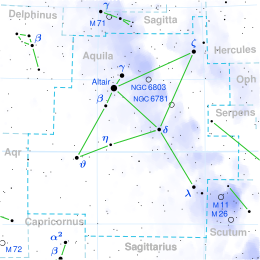Omega2 Aquilae, Latinized from ω2 Aquilae, is the Bayer designation for a star in the equatorial constellation of Aquila, the eagle.[10] It has an apparent visual magnitude of 6.0,[2] which is close to the lower limit of detectability with the naked eye. According to the Bortle Dark-Sky Scale, this star can be viewed from dark rural skies. As the Earth orbits about the Sun, this star undergoes a parallax shift of 11.7 mas.[1] This is equivalent to a physical distance of 279 light-years (86 parsecs) from Earth, give or take a 2 light year margin of error. The star is drifting closer to the Sun with a radial velocity of −26 km/s.[2]
| Observation data Epoch J2000.0 Equinox J2000.0 (ICRS) | |
|---|---|
| Constellation | Aquila |
| Right ascension | 19h 19m 53.06713s[1] |
| Declination | +11° 32′ 05.8722″[1] |
| Apparent magnitude (V) | 6.03[2] |
| Characteristics | |
| Spectral type | A2 V[3] or F0V[2] |
| U−B color index | +0.087±0.007[2] |
| B−V color index | +0.08[4] |
| Astrometry | |
| Radial velocity (Rv) | −26.0±4.3[5][2] km/s |
| Proper motion (μ) | RA: 44.042[1] mas/yr Dec.: 22.393[1] mas/yr |
| Parallax (π) | 11.7035 ± 0.0703 mas[1] |
| Distance | 279 ± 2 ly (85.4 ± 0.5 pc) |
| Absolute magnitude (MV) | 1.48[2] |
| Details | |
| Mass | 2.01[6] M☉ |
| Radius | 2.0[7] R☉ |
| Luminosity | 22[2] L☉ |
| Temperature | 8,936[8] K |
| Rotational velocity (v sin i) | 154[9] km/s |
| Age | 224[6] Myr |
| Other designations | |
| Database references | |
| SIMBAD | data |
Analysis of the spectrum of this white-hued star shows it to match a stellar classification of A2 V,[3] indicating it is an A-type main sequence star. It has about double the size and mass of the Sun.[7] The star is radiating 22[2] times the luminosity of the Sun from its photosphere at an effective temperature of 8,936 K,[8] giving it the white hue of an A-type star.[11] Omega2 Aquilae is 224[6] million years old and is spinning rapidly with a projected rotational velocity of 154 km/s.[9]
References
edit- ^ a b c d e f Brown, A. G. A.; et al. (Gaia collaboration) (August 2018). "Gaia Data Release 2: Summary of the contents and survey properties". Astronomy & Astrophysics. 616. A1. arXiv:1804.09365. Bibcode:2018A&A...616A...1G. doi:10.1051/0004-6361/201833051. Gaia DR2 record for this source at VizieR.
- ^ a b c d e f g h i Anderson, E.; Francis, Ch. (2012), "XHIP: An extended hipparcos compilation", Astronomy Letters, 38 (5): 331, arXiv:1108.4971, Bibcode:2012AstL...38..331A, doi:10.1134/S1063773712050015, S2CID 119257644.
- ^ a b Cowley, A.; et al. (April 1969), "A study of the bright A stars. I. A catalogue of spectral classifications", Astronomical Journal, 74: 375–406, Bibcode:1969AJ.....74..375C, doi:10.1086/110819.
- ^ Osawa, K.; Hata, S. (1962), "Three-color photometry of B8-A2 stars (II).", Annals of the Tokyo Astronomical Observatory, 7: 209, Bibcode:1962AnTok...7..209O.
- ^ Evans, D. S. (June 20–24, 1966), "The Revision of the General Catalogue of Radial Velocities", in Batten, Alan Henry; Heard, John Frederick (eds.), Determination of Radial Velocities and their Applications, Proceedings from IAU Symposium no. 30, vol. 30, University of Toronto: International Astronomical Union, p. 57, Bibcode:1967IAUS...30...57E.
- ^ a b c David, Trevor J.; Hillenbrand, Lynne A. (2015), "The Ages of Early-Type Stars: Strömgren Photometric Methods Calibrated, Validated, Tested, and Applied to Hosts and Prospective Hosts of Directly Imaged Exoplanets", The Astrophysical Journal, 804 (2): 146, arXiv:1501.03154, Bibcode:2015ApJ...804..146D, doi:10.1088/0004-637X/804/2/146, S2CID 33401607.
- ^ a b Pasinetti Fracassini, L. E.; et al. (February 2001), "Catalogue of Apparent Diameters and Absolute Radii of Stars (CADARS) - Third edition - Comments and statistics", Astronomy and Astrophysics, 367 (2): 521–524, arXiv:astro-ph/0012289, Bibcode:2001A&A...367..521P, doi:10.1051/0004-6361:20000451, S2CID 425754.
- ^ a b Soubiran, C.; Le Campion, J.-F.; Cayrel de Strobel, G.; Caillo, A. (June 2010), "The PASTEL catalogue of stellar parameters", Astronomy and Astrophysics, 515: A111, arXiv:1004.1069, Bibcode:2010A&A...515A.111S, doi:10.1051/0004-6361/201014247, S2CID 118362423.
- ^ a b Royer, F.; Zorec, J.; Gómez, A. E. (February 2007), "Rotational velocities of A-type stars. III. Velocity distributions", Astronomy and Astrophysics, 463 (2): 671–682, arXiv:astro-ph/0610785, Bibcode:2007A&A...463..671R, doi:10.1051/0004-6361:20065224, S2CID 18475298.
- ^ a b "ome02 Aql". SIMBAD. Centre de données astronomiques de Strasbourg. Retrieved 2012-07-21.
- ^ "The Colour of Stars", Australia Telescope, Outreach and Education, Commonwealth Scientific and Industrial Research Organisation, December 21, 2004, archived from the original on March 18, 2012, retrieved 2012-01-16.
